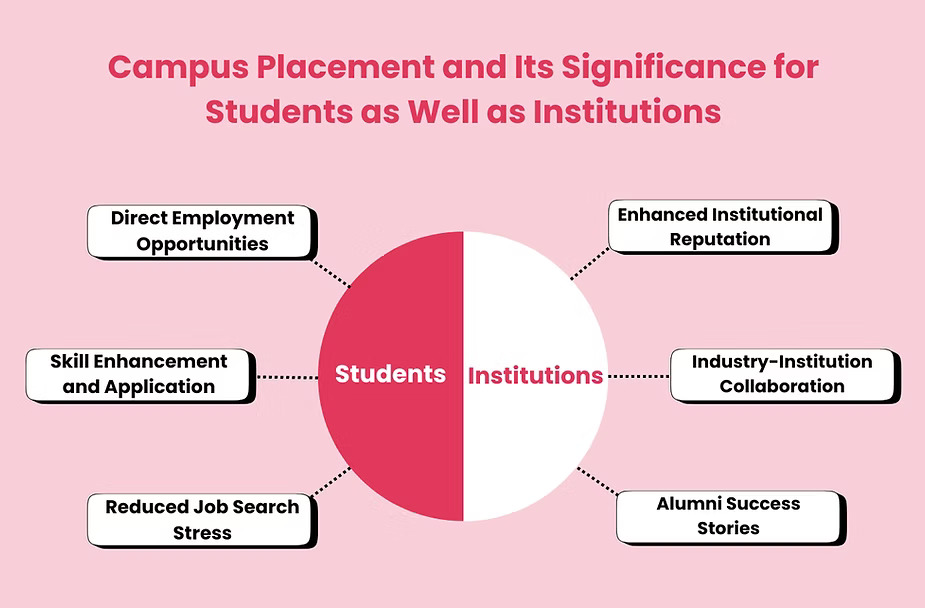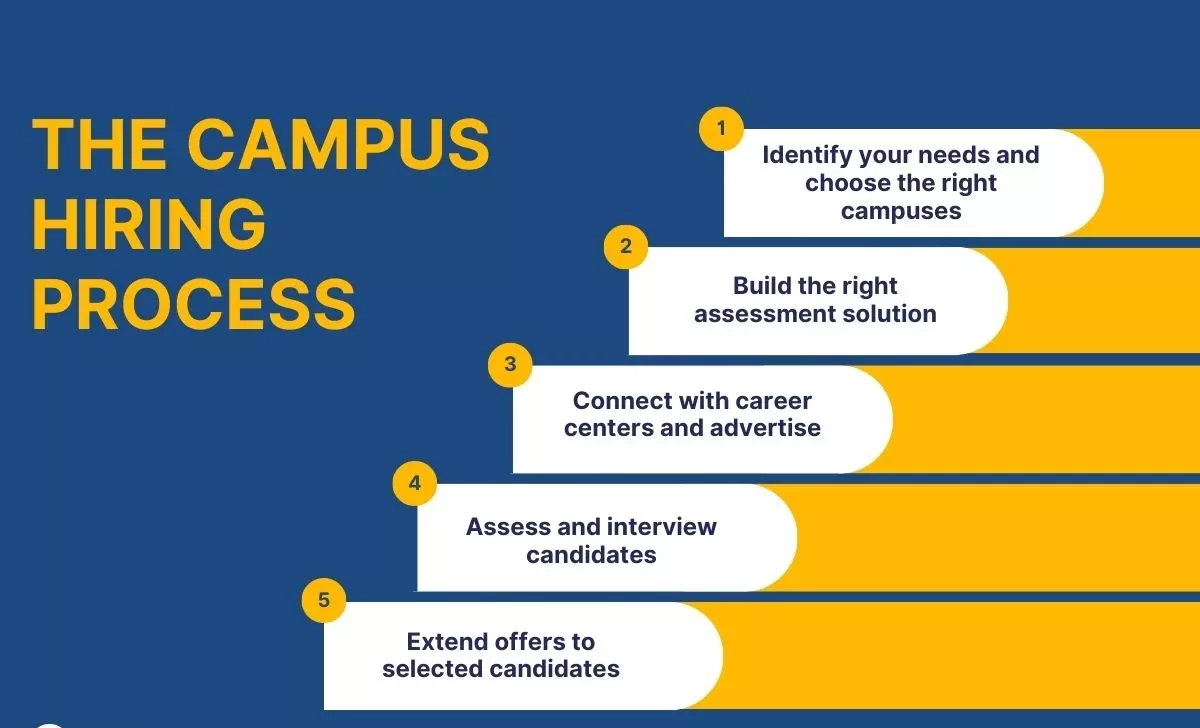Campus Placement Tips: How to Get Hired Fast
Table of Contents

It’s not your GPA. It’s not the paper resume. And it’s definitely not the number of certificates you’ve collected at college fairs.
When it comes to campus placements, what really matters is how prepared you are to be hired, not just how well you’ve performed academically.
Here’s the thing: companies aren’t looking to hire perfect students; they’re looking to hire problem-solvers who can work, adapt, and grow. And if you’ve been wondering why your name hasn’t popped up on the final placement list (even though your CGPA says it should), this guide is exactly what you need.
Why Campus Placements Are Still a Big Deal

*iscalepro.com
While startups, freelance gigs, and LinkedIn side hustles are becoming common, campus placements still remain one of the most direct routes to employment. For many students, especially from Tier 2 and Tier 3 colleges, this is often their first real chance to land a job in big companies.
But competition is fierce. Out of hundreds of applicants, only a few get shortlisted, and even fewer are hired.
So, how do you make yourself stand out?
Spoiler: It’s not by waiting for luck to strike. It’s about playing the game smart, knowing the process inside-out, and preparing better than the rest.
Step-by-Step Strategy to Crack Campus Placements

*unstop.com
Here’s your practical, no-fluff breakdown of tips for campus placement success.
1. Treat It Like a Campaign, Not a Test
Campus placements aren’t about ‘topping’ an exam. They’re about presenting your most hireable self repeatedly, in front of different recruiters, with different expectations.
Think of it like marketing a product. You are the product. Your resume is the brochure. Your interview is the pitch.
Before placements begin:
- Shortlist your target companies
- Understand their eligibility and expectations
- Track the placement calendar closely
- Make a timeline for mock tests, group discussion prep, and interviews
Pro Tip: Build a spreadsheet. Treat yourself like a startup pitching to investors. Keep tabs on every interaction.
2. Don’t Just Build a Resume, Build a Story
Most resumes read like shopping lists: “Java. C++. Python. Internship at XYZ. Event head of ABC.”
But recruiters don’t want a list. They want a narrative. Use your resume to tell a consistent story about who you are, what you bring, and where you’re headed.
Ask yourself:
- What problem can I solve for this company?
- Why would a recruiter remember me after 20 interviews?
- How do my projects show initiative, not just participation?
Bonus: Quantify wherever possible, like “Increased XYZ club’s participation by 40%” > “Member of XYZ Club.”
3. Focus on the First 10 Seconds
Whether it’s your resume, your interview introduction, or your answer in a GD, the first 10 seconds decide whether they want to hear more.
So, polish your:
- Elevator pitch: A 30-second intro about who you are and what excites you
- Resume headline: A crisp one-liner at the top that hooks attention
- LinkedIn summary: To better understand their expectations and tailor your answers
This is how you instantly position yourself as someone worth hiring.
4. Practice Aptitude Like a Sport
Almost every company starts with an aptitude or technical test. And guess what?
Even the smartest students fail this part, not because they’re not intelligent, but because they’re underprepared.
If you’re wondering how to get employed fast, this is the one filter you must cross first.
How to prep:
- Use platforms like IndiaBix, GeeksforGeeks, or PrepInsta
- Solve 20–30 questions daily in each category (Quant, Reasoning, Verbal)
- Time your sessions, as speed matters
Real Insight: Some companies reuse questions across campuses. Ask seniors from previous years. Patterns repeat.
5. Kill It in Group Discussions
Let’s bust a myth: Being loud doesn’t mean you’re leading.
Group Discussions (GD) are used to test your:
- Team behavior
- Listening skills
- Assertiveness vs aggression
- Thought clarity
To do well:
- Be the person who brings structure (“Let’s look at this in 3 parts…”)
- Support quieter members. It shows leadership.
- Avoid cutthroat arguments. Stay sharp but respectful.
Remember: Your goal isn’t to win. It’s to be seen as someone others want to work with.
6. Interviews: Focus on Value, Not Vocabulary
You don’t need to use fancy words. You need to show that you think clearly and can add value.
Most students memorize 30 behavioral answers. But here’s what works better:
- Learn to break down your thoughts like a consultant
- Use real-world examples from college life to show decision-making
- Be honest about what you don’t know, but show a willingness to learn
And yes, research the company before you sit. Know their latest products, services, and work culture. Ask thoughtful questions at the end.
7. Network Internally
Campus placements aren’t just about placement officers; they’re also about soft signals and referrals.
- Be on good terms with professors and TPOs
- Join alumni groups on LinkedIn
- Ask seniors who cracked roles last year for mock interview sessions
You never know when a quick heads-up or internal push can land you a shortlist.
8. Build a Digital Trail of Credibility
In today’s world, even campus hiring teams Google you.
So clean up your digital footprint:
- Make your LinkedIn profile professional, not cringey
- Add your projects and certificates on GitHub/Behance/Notion
- Remove memes from your Twitter if it’s public
Companies may not admit it, but they notice.
9. Always Have a Plan B
Don’t pin everything on one company or one dream role.
Keep multiple tracks open, like:
- Online internships
- Off-campus hiring pipelines
- Freelance projects
Having a backup doesn’t mean you’re pessimistic. It means you’re smart.
Why Some Students Get Hired Fast (Even Without Top Scores)
Here’s what recruiters notice (even if you don’t have a gold medal GPA):
- Clarity: You know what you want and why.
- Coachability: You’re open to feedback.
- Grit: You show consistency, not just brilliance.
- Relevance: You’ve actually prepared for that specific role.
If you can combine mindset + preparation + presentation, you’ll start getting shortlisted faster than you expect.
Fast Hacks That Help With Campus Interviews (When You’re Short on Time)
Need to make a quick leap into being “placement-ready”? Here are some last-mile tips for campus placement:
- Mock Interviews with Alumni: They’re brutally honest and industry-aligned.
- Reverse Engineer From Job Descriptions: What are they asking for again and again? Fix your resume to reflect those.
- Build 1 Portfolio Project: Something you made, ran, led, or improved to show initiative.
- Pre-reads for Aptitude & Domain Tests: Practice company-specific formats, not just random Apti PDFs.
- Email Follow-ups Post-Interview: 90% don’t do this. A thank-you note stands out.
How Jaro Education Helps You Move Ahead After Campus Placements
Campus placements don’t define your future; they just mark the beginning. If you didn’t make the Day 1 shortlist or you’re from a Tier 2/3 college, you’re not out of the race.
At Jaro Education, we offer high-impact upskilling programs designed for graduates who want to break into top-tier companies. From global MBAs to industry-certified executive courses, Jaro equips you with exactly what hiring managers in big companies look for: business-ready skills, strategic thinking, and a sharper competitive edge.
So even if the campus didn’t open the door, Jaro helps you build the key.
Conclusion
If you’re reading this before your placement season has begun, you’re already ahead.
Campus placements are often chaotic, competitive, and unpredictable—but with the right clarity, strategy, and mindset, you don’t just participate—you compete.
And remember: It’s not about getting lucky. It’s about getting ready.
Frequently Asked Questions
What is campus placement, and how does it work?
Campus placement is the recruitment process where companies visit colleges to hire students before graduation. It’s one of the most direct ways to get a job in big companies.
How can I prepare for campus placement interviews?
To ace campus placement interviews, focus on aptitude, communication, and company-specific research. Strong preparation increases your chances of getting a job in a big company.
What are the common mistakes to avoid during campus placement?
Lack of preparation, poor communication, and ignoring the job profile are common errors. These mistakes can cost you a chance at campus placement and make it harder to get a job in big companies.
Is it possible to get placed in a big company without campus placement?
Yes, many students miss campus placement but later succeed through off-campus drives or upskilling. Knowing how to get a job in big companies beyond campus is essential.
How important is academic performance in campus placements?
Most recruiters consider your academic consistency during campus placement shortlisting. But smart upskilling and interview performance matter more when aiming to get a job in big companies.
What skills do companies look for during campus placement?
In campus placement, companies prioritize problem-solving, communication, and adaptability. These skills are key if you want to get a job at a big company.
What should I do if I don’t get selected in the campus placement?
If campus placement doesn’t work out, consider post-grad upskilling, internships, or specialized career programs. Many students still figure out how to get a job in big companies through alternative paths.
Recent Blogs
It seems we can't find what you're looking for.















